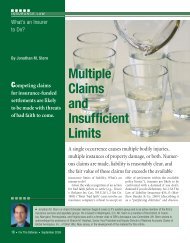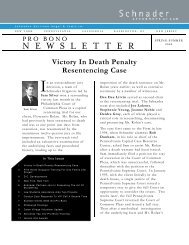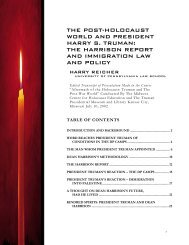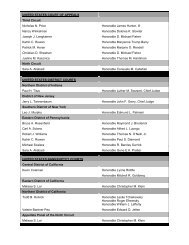Filed the first CD-ROM brief in the U.S. Supreme Court - Schnader ...
Filed the first CD-ROM brief in the U.S. Supreme Court - Schnader ...
Filed the first CD-ROM brief in the U.S. Supreme Court - Schnader ...
You also want an ePaper? Increase the reach of your titles
YUMPU automatically turns print PDFs into web optimized ePapers that Google loves.
First <strong>CD</strong>-<strong>ROM</strong> Brief Accepted by <strong>Supreme</strong> <strong>Court</strong><br />
Page 9 of 31<br />
obscene or o<strong>the</strong>rwise outside <strong>the</strong> scope of <strong>the</strong> First Amendment's protections. By def<strong>in</strong>ition, <strong>the</strong>n, this<br />
action challenges only <strong>the</strong> <strong>CD</strong>A's prohibition of speech that is constitutionally protected. A statute is<br />
constitutionally overbroad if it presents a genu<strong>in</strong>e likelihood that it will prohibit a substantial amount of<br />
speech that is beyond its permissible application. See Massachusetts v. Oakes, 491 U.S. 576 (1989);<br />
Board of Airport Commissioners v. Jews for Jesus, Inc., 482 U.S. 569 (1987); Schad v. Mount Ephraim,<br />
452 U.S. 61 (1981). Because <strong>the</strong> speech placed on <strong>the</strong> Internet by amici and by appellees is protected<br />
speech under <strong>the</strong> First Amendment, <strong>the</strong> court below correctly held (929 F. Supp. at 851, 858, 867 n.2)<br />
— and <strong>the</strong> Government's <strong>brief</strong> does not appear seriously to contest — that <strong>the</strong> <strong>CD</strong>A's content-based<br />
crim<strong>in</strong>al prohibition on that speech must be subjected to strict scrut<strong>in</strong>y. Whatever verbal [P. 5] formula<br />
is used to describe this applicable standard, <strong>the</strong> <strong>CD</strong>A must be narrowly tailored to achieve its stated<br />
justification, no matter how compell<strong>in</strong>g that justification may be, or, stated differently, must be <strong>the</strong> least<br />
restrictive alternative restriction on speech that will satisfy that objective. Denver Area Educational<br />
Telecommunications Consortium v. FCC, 518 U.S. __, 116 S. Ct. 2374, 2391-92 (1996).<br />
This <strong>Court</strong> has held that an ord<strong>in</strong>ance that prohibited <strong>the</strong> display of nudity at drive-<strong>in</strong> <strong>the</strong>aters but<br />
<strong>in</strong>cluded <strong>in</strong> its sweep non-obscene films protected by <strong>the</strong> First Amendment was unconstitutionally<br />
overbroad. See Erznoznik v. City of Jacksonville, 422 U.S. 205 (1975). The <strong>Court</strong> observed that while<br />
"[m]uch that we encounter offends our es<strong>the</strong>tic, if not our political and moral, sensibilities," never<strong>the</strong>less<br />
"<strong>the</strong> Constitution does not permit government to decide which types of o<strong>the</strong>rwise protected speech are<br />
sufficiently offensive to require protection for <strong>the</strong> unwill<strong>in</strong>g listener or viewer." 422 U.S. at 210. The<br />
<strong>Court</strong> noted that <strong>the</strong> Jacksonville ord<strong>in</strong>ance, like <strong>the</strong> <strong>CD</strong>A here, discrim<strong>in</strong>ated among movies "solely on<br />
<strong>the</strong> basis of content," id. at 211, and that its effect would be "to deter drive-<strong>in</strong> <strong>the</strong>aters from show<strong>in</strong>g<br />
movies conta<strong>in</strong><strong>in</strong>g any nudity, however <strong>in</strong>nocent or even educational." Id. Reject<strong>in</strong>g arguments that<br />
protection of m<strong>in</strong>ors warranted <strong>the</strong> sweep<strong>in</strong>g content-based prohibition <strong>in</strong> Erznoznik, <strong>the</strong> <strong>Court</strong> observed<br />
that m<strong>in</strong>ors <strong>the</strong>mselves have a significant First Amendment right to receive speech and that this right is<br />
<strong>in</strong>fr<strong>in</strong>ged by a law that "sweep<strong>in</strong>gly forbids <strong>the</strong> display of all films conta<strong>in</strong><strong>in</strong>g any uncovered buttocks or<br />
breasts, irrespective of content or pervasiveness." Id. at 213. The <strong>Court</strong> added:<br />
Thus [<strong>the</strong> ord<strong>in</strong>ance] would bar a film conta<strong>in</strong><strong>in</strong>g a picture of a baby's buttocks, <strong>the</strong> nude<br />
body of a war victim, or scenes from a culture <strong>in</strong> which nudity is <strong>in</strong>digenous. The ord<strong>in</strong>ance<br />
also might prohibit news- reel scenes of <strong>the</strong> open<strong>in</strong>g of an art exhibit as well as shots of<br />
ba<strong>the</strong>rs on a beach. Clearly all nudity cannot be deemed obscene even as to m<strong>in</strong>ors. Nor can<br />
such a broad restriction be justified by any o<strong>the</strong>r governmental <strong>in</strong>terest perta<strong>in</strong><strong>in</strong>g to m<strong>in</strong>ors.<br />
Speech that is [P. 6] nei<strong>the</strong>r obscene as to youths nor subject to some o<strong>the</strong>r legitimate<br />
proscription cannot be suppressed solely to protect <strong>the</strong> young from ideas or images that a<br />
legislative body th<strong>in</strong>ks unsuitable for <strong>the</strong>m.<br />
Id. at 213-14 (citation and footnote omitted). The <strong>Court</strong>'s characterization of <strong>the</strong> Jacksonville ord<strong>in</strong>ance<br />
could apply just as well to <strong>the</strong> <strong>CD</strong>A.<br />
In enact<strong>in</strong>g <strong>the</strong> <strong>CD</strong>A, Congress failed to recognize and provide for <strong>the</strong> First Amendment protection<br />
enjoyed by speech that has serious social, political, literary, artistic, medical, or educational merit.<br />
"Indecency often is <strong>in</strong>separable from <strong>the</strong> ideas and viewpo<strong>in</strong>ts conveyed, or separable only with loss of<br />
truth or expressive power." Denver Area, 116 S. Ct. at 2416 (separate op<strong>in</strong>ion of Kennedy, J.). But by<br />
ignor<strong>in</strong>g <strong>the</strong> redeem<strong>in</strong>g qualities of <strong>the</strong> speech, <strong>the</strong> <strong>CD</strong>A crim<strong>in</strong>alizes all speech that might be viewed as<br />
"<strong>in</strong>decent" or "patently offensive as measured by contemporary community standards" <strong>in</strong> <strong>the</strong> hands of<br />
children, regardless of <strong>the</strong> value that <strong>the</strong> speech may have for children (particularly adolescents). And it<br />
utterly disregards <strong>the</strong> value of this speech to adults. The Government itself admits (Govt. Br. at 17-18)<br />
that "[t]here may be borderl<strong>in</strong>e cases <strong>in</strong> which it is difficult to determ<strong>in</strong>e on which side of <strong>the</strong> l<strong>in</strong>e<br />
particular material falls." 2 The <strong>CD</strong>A's sweep renders it unconstitutionally overbroad. "Quarant<strong>in</strong><strong>in</strong>g <strong>the</strong><br />
general [Internet] public aga<strong>in</strong>st [transmissions] not too rugged for grown men and women <strong>in</strong> order to<br />
file://C:\Documents and Sett<strong>in</strong>gs\u0072943\Desktop\Brief.htm<br />
7/11/2008







